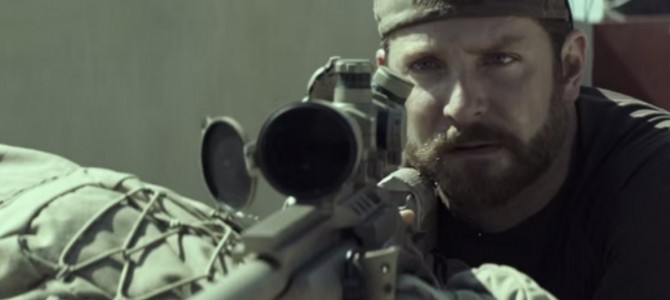“American Sniper,” the Clint Eastwood-directed movie based on the life of Iraq War sniper Chris Kyle, fills dual roles. Primarily, it is a gritty and moving war story about the heroes who have answered America’s call to arms. Secondarily, it is an unapologetic manifesto from Eastwood about what it means to be an American and a warrior today.
The movie tells the story of Chris Kyle, a Texan with deadly aim who signed up for the Navy in 1999. After enduring the rigorous SEAL training, Kyle’s life changed along with that of the nation upon the terrorist attacks of 2001. He served four tours of duty in Iraq, becoming the most lethal sniper in the history of the United States, with 160 confirmed kills. The movie is based on his memoirs, with a completely transformed Bradley Cooper effortlessly convincing in the title role. A Marine he had been attempting to help heal from post-traumatic stress disorder (PTSD) killed Kyle in 2013.
Eastwood demonstrates both deft storytelling and moral conviction by opening the movie with the most difficult scenario imaginable. Kyle provides cover for a platoon of Marines as they occupy Fallujah block by hostile block. Through the viewfinder of his rifle, he sees a woman hand something to a child, a boy just on the verge of puberty. As the child advances on soldiers, Kyle must make a series of unimaginable choices. He must determine if the object the boy carries is, as he suspects, a bomb. And, if so, if he should shoot him.
This scene, and the others that follow it, separate the film from overly sentimental, flag-waving pro-military films as well as from the dismal anti-war films mainstream Hollywood has produced about the Iraq War. These unimaginable situations are the weight soldiers take upon themselves to protect those at home and defy manipulation.
A Clear Conception of Good and Evil
“There are three types of people,” Kyle’s father tells him as a child, although it is clear the words are an Eastwood editorial: “Sheep, wolves, and sheepdogs.” The sheep go through life refusing to see evil. The wolves are the evil preying on the sheep. But the sheepdogs? They protect the sheep. They fight the evil. The evil against which Americans fought is very clear in this film. One scene in particular is hard to watch, as an Iraqi strongman tortures a child with a power drill.
The violence shown in the movie is minor compared with barbaric stories coming out of the Middle East about the thugs who are now given free reign in Iraq and surrounding areas. No one can legitimately accuse this film of exaggeration, although some will surely try. If anything the movie tones it down, but the violence, along with swearing and some sexuality, earn the film an R rating. Mature teens could watch, but it will be too much for younger children and some adults.
The role of sheepdog is a role Kyle takes seriously, even with confronted by evil in Iraq that he never considered in Texas. But he has other roles to play, as well. The story is as much a love story between Chris and Taya Kyle (Sienna Miller) as a warrior tale. It highlights the cost the family of service members pay. The wonders of modern technology have a dark side when pregnant Taya calls Kyle. Their pleasant conversation devolves to panic when Chris is pinned down by enemy fire and Taya can only listen as explosions and shots rain down on her husband a world away.
Regrets, I’ve Had a Few
Being a soldier is not all heroics and rousing march music. Taya reaches the end of her rope long before Chris is done soldiering. When he finally does come home, the journey is longer than either of them imagines. The ability of people to blithely go on with life as soldiers die horrifies him. Sounds activate his instincts, dogs are enemies, he can’t sleep, friends don’t understand. Chris has PTSD, but that’s not the end of the story either.
Chris tells his psychologist that, yes indeed, he does feel haunted. But he’s not haunted, as good liberals would demand, by the enemy soldiers he’s killed or even the women and children that found their way into his crosshairs. He tells the psychologist that his conscience is clear on their account. His regrets stem from those he could not save, the brothers in arms he lost, the civilians the bad guys murdered.
This is the part of the film that is unapologetic and that will make heads explode on the Left. If one must, absolutely must, be a solider, he should at least have the decency to fall to pieces with guilt over the lives he had to take. Furthermore, he should blame the country that put him in the position of having to do so. He should be a pitiful victim of forces greater than himself.
Kyle, and Clint Eastwood, does not tow this line. A warrior has a job to do. It is a noble job. It is a hard job. He takes those moments upon himself so the rest of us will not have to. He looks evil in the eye and stands up to it so we can sleep soundly. The film doesn’t need to wave flags, and Eastwood is judicially restrained, because the story speaks for itself. So does the real-life footage in the credits of the throngs of people who lined the streets of Texas to give this American soldier a respectful goodbye. Stay through them and be moved to tears.
With Eastman’s skill and Cooper’s acting, “American Sniper” should be a contender for Best Picture. It is unlikely it will be, which is a shame.









